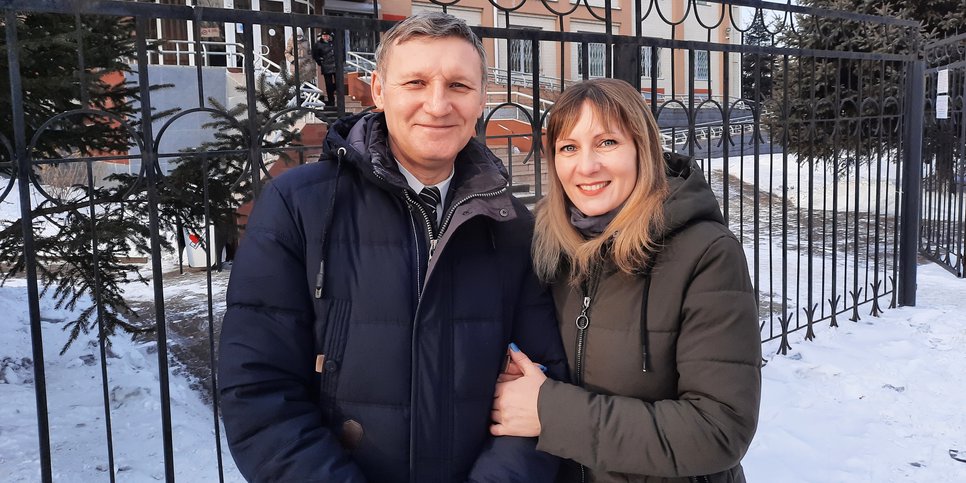In the photo: Konstantin and Anastasia Guzev. Birobidzhan, February 18, 2021
In the photo: Konstantin and Anastasia Guzev. Birobidzhan, February 18, 2021
A sentencing for a 70th Jehovah's Witness. A Birobidzhan court handed Konstantin Guzev a two-and-a-half year suspended sentence for practicing his faith
Jewish Autonomous AreaOn February 18, 2021, Aleksey Ivashchenko, a Birobidzhan District Court judge of the Jewish Autonomous Region, handed a two-and-a-half year suspended sentence to Konstantin Guzev, a law-abiding construction worker, for participation in extremist activities. In addition, Guzev was given a two-year probation period with the obligation to report once a month to a supervisory authority.
The prosecutor asked for 4 years of imprisonment in a penal colony of general regime and an additional 1-year restriction with the obligation to report once a month to the supervisory authorities. The verdict has not come into force. There are no victims in the case. The believer pleaded not guilty and would appeal the verdict. Konstantin Guzev spent the last year and a half being released on his own recognizance.
The Birobidzhan District Court is also hearing the case of Konstantin's wife Anastasia, accused of a similar article. The couple faced discrimination on religious grounds - they were forced to resign from the music school. The management motivated this by the fact that "extremists" in the children's institution had no place.
On May 17, 2018, a large-scale operation codenamed "Judgment Day" took place in Birobidzhan, involving 150 law enforcement officers.
The criminal case for faith against Konstantin Guzev was initiated on July 29, 2019. The case was separated from the materials of the criminal case against Alam Aliyev. The case was investigated by the Department of the Federal Security Service of Russia in the Jewish Autonomous Region. The investigation lasted about 5 months. The prosecution was based on video footage secretly filmed during religious meetings of believers, and on the testimony of police officer Zvereva, who also acted as a prosecution witness in the cases of Evgeny Golik, Anastasia Sycheva and Tatiana Zagulina.
On December 23, 2019, the case went to the Birobidzhan District Court of the EAD. During the court hearings, the prosecutor officially declared the defendant's house the scene of the crime. The charges essentially boiled down to the fact that Konstantin Guzev was reading the Bible with friends at his home via Skype. In court, the believer noted, "The evidence presented by the prosecutor only confirms that I practice the religion of Jehovah's Witnesses. In other words, it proves that there was no corpus delicti in my actions."
In the Jewish Autonomous Region, one of the regions with the largest number of criminal cases against Jehovah's Witnesses, 19 cases were brought against 22 believers. Eight local Jehovah's Witnesses have already been convicted for these peaceful people exercising their constitutional right to freedom of religion. Earlier, Judge Alexei Ivaschenko sentenced another believer, Igor Tsarev, to 2.5 years of suspended imprisonment. Ivaschenko is also considering the case of Yevgeny Yegorov.
Konstantin Guzev became the 70th resident of modern Russia to be punished under a criminal article merely for his profession of faith in the God Jehovah. A suspended sentence with probation condemns the believer to a life of constant fear, since he could go to prison at any time if law enforcement authorities deem his individual confession of faith "an extension of the organization's activities.
Russian human rights organizations, as well as the international community, consider the criminal prosecution of Jehovah's Witnesses in Russia unlawful. The Russian Government has stated repeatedly that the Russian courts' decisions to liquidate and ban Jehovah's Witnesses organizations 'do not assess the doctrine of Jehovah's Witnesses and contain no restriction or prohibition to individually profess the aforementioned doctrine'. At the end of January 2021, Russian President Vladimir V. Putin again instructed the Supreme Court of the Russian Federation to deal with "violations of the legislation on freedom of conscience, freedom of religion, and religious associations."

